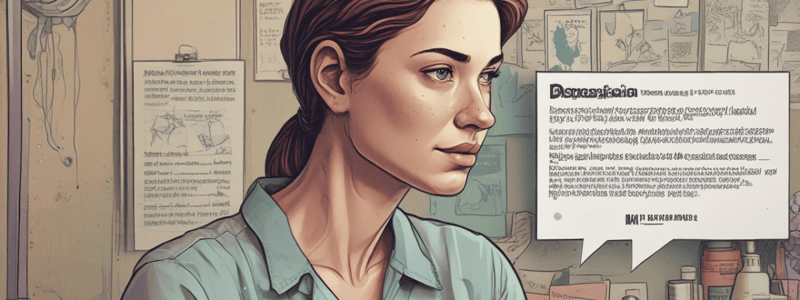Podcast
Questions and Answers
What type of symptoms may suggest the presence of psychosis in a depressed patient?
What type of symptoms may suggest the presence of psychosis in a depressed patient?
Which of the following is a common psychological symptom associated with depression?
Which of the following is a common psychological symptom associated with depression?
What can be inferred about the importance of inquiring about suicidal intent?
What can be inferred about the importance of inquiring about suicidal intent?
Which of the following symptoms should prompt further enquiry about other symptoms in a patient?
Which of the following symptoms should prompt further enquiry about other symptoms in a patient?
Signup and view all the answers
"Feeling of distance", "poor concentration", and "low self-esteem" are described as signs related to:
"Feeling of distance", "poor concentration", and "low self-esteem" are described as signs related to:
Signup and view all the answers
What is the approximate number of people suffering from depression in the UK at any given time?
What is the approximate number of people suffering from depression in the UK at any given time?
Signup and view all the answers
Which gender is more likely to suffer from depression?
Which gender is more likely to suffer from depression?
Signup and view all the answers
What percentage of depression cases are not detected?
What percentage of depression cases are not detected?
Signup and view all the answers
Which of the following is a potential cause of depression ?
Which of the following is a potential cause of depression ?
Signup and view all the answers
Which physical disorder is NOT listed as being associated with depression?
Which physical disorder is NOT listed as being associated with depression?
Signup and view all the answers
Which drug is mentioned in the text as potentially causing symptoms of depression?
Which drug is mentioned in the text as potentially causing symptoms of depression?
Signup and view all the answers
What is one of the screening questions for depression?
What is one of the screening questions for depression?
Signup and view all the answers
Which type of disorders are commonly associated with depression?
Which type of disorders are commonly associated with depression?
Signup and view all the answers
Study Notes
History of Depression
- Onset of depression includes precipitating events and nature of symptoms
- Severity and impact on life, as well as past history of similar symptoms, mood elevation, or other mental health problems
- Previous response to treatment and current life events, including stressors at home and work, are important to consider
Family and Social History
- Quality of interpersonal relationships, living conditions, and social isolation are important factors
- Co-existent medical conditions and current medication, including prescribed and non-prescribed drugs, should be taken into account
Symptoms of Depression
- Symptoms present >50% of the time in the past 2 weeks, with two key features: depressed mood and/or reduced interest or pleasure, which must be disabling to the patient
- Other symptoms include:
- Change in appetite/weight
- Insomnia or hypersomnia
- Fatigue or loss of energy
- Poor concentration
- Poor appetite or overeating
- Low energy or fatigue
- Low self-esteem
- Sense of worthlessness or guilt
- Recurrent thoughts of death/suicide
- Psychomotor agitation/retardation
- Feelings of hopelessness
- Poor concentration or difficulty making decisions
Examination and Assessment
- General appearance, including self-neglect, smell of alcohol, weight loss or weight gain
- Assessment of mood, including depression, tiredness, speech monotone or monosyllabic, avoids eye contact, tearful, anxious or jumpy/fidgety
- Psychotic symptoms, such as hallucinations and delusions, should be considered
Epidemiology of Depression
- 2.3 million people suffer from depression in the UK at any time
- Women are twice as likely to suffer from depression as men
- Around 30-50% of cases are not detected, although most are mild cases that may resolve spontaneously
Screening Questions for Depression
- During the last month, have you often been bothered by feeling down, depressed, or hopeless?
- During the last month, have you often been bothered by having little interest or pleasure in doing things?
- If +ve response to either question, investigate further with PHQ-9
Causes and Co-Morbidity
- Associated with psychiatric disorders, such as anxiety, alcohol abuse, substance abuse, and eating disorders
- Associated with physical disorders, such as PD, MS, dementia, thyroid disorders, Addison's disease, hypercalcaemia, RA, SLE, cancer, HIV, and other chronic infections
- Associated with cardio- and cerebrovascular disease, learning disability, and certain medications that can cause symptoms of depression
Studying That Suits You
Use AI to generate personalized quizzes and flashcards to suit your learning preferences.
Related Documents
Description
Learn about depression with Professor Chantal Simon and explore screening questions for depression. Understand the prevalence of depression in the UK and the key symptoms to look out for. Watch informative videos and gain insights into this mental health condition.




